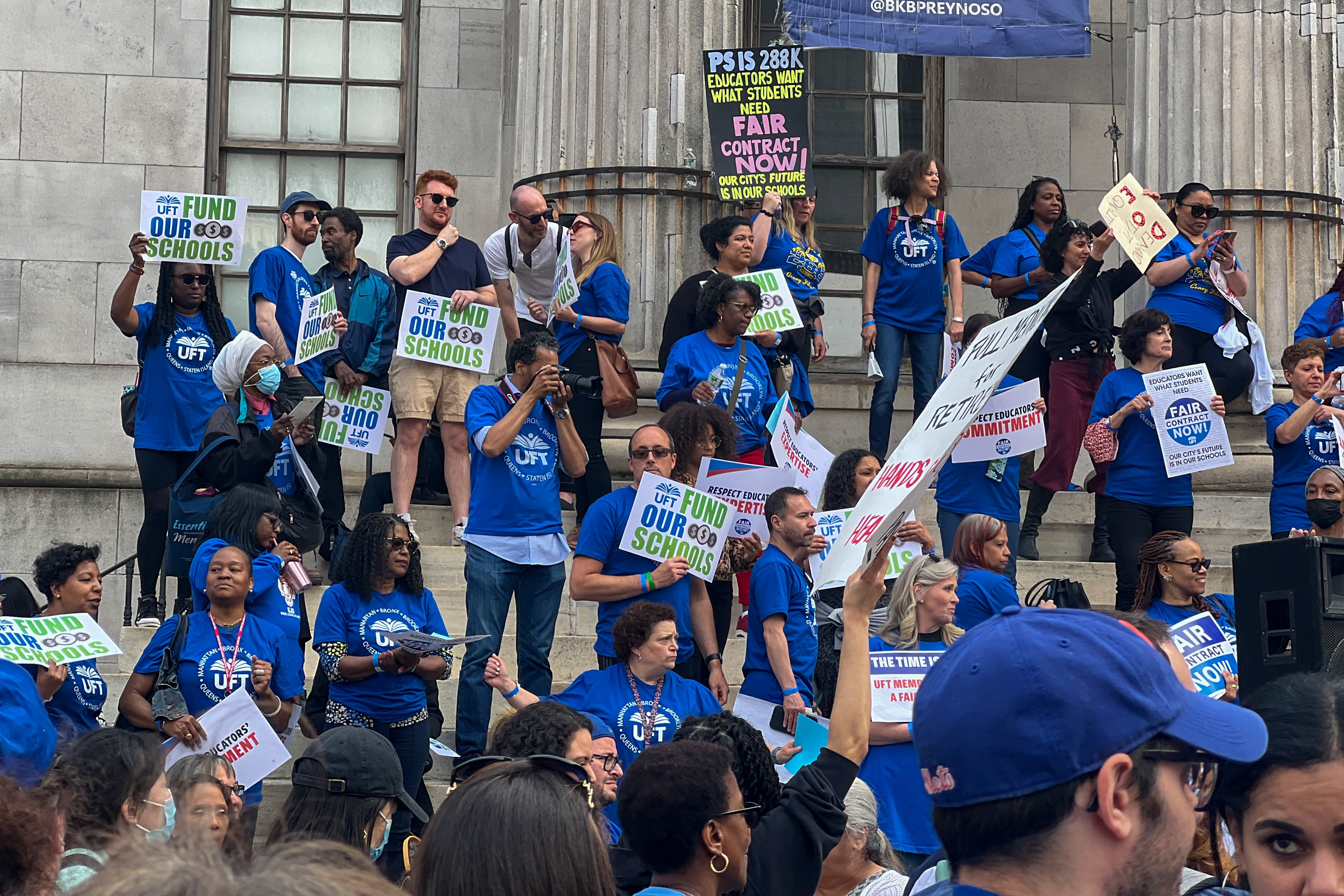Starting salaries for New York City teachers will increase to $72,350 by 2026 under the United Teachers Federation’s newly ratified contract.
That’s 18.5% more than the current starting salary of $61,070.
But while teachers and other members of their union approved the contract this week, school-based occupational and physical therapists are holding out for their own deal.
Because the therapists voted against the contract, they will not receive pay increases, signing bonuses, or other increased benefits. Instead, they will continue working under the terms of the 2018 contract until their bargaining unit can reach a new deal with the city.
UFT officials said they planned to discuss next steps with the chapter’s members.
The teachers’ five-year contract, which is retroactive to 2022, includes 3% wage increases for the first three years, followed by a 3.25% increase in the fourth year, and 3.5% in the fifth year. In addition, teachers will get one-time signing bonuses of $3,000 each and annual bonuses of $400 in 2024, $700 in 2025, and $1,000 in 2026.
The union represents 115,000 full-time and 5,000 part-time education department employees, including paraprofessionals, school secretaries, and social workers. Three-quarters of them voted on the new contract, according to the union.
Of the union members who voted this week, 75% approved the contract, according to the American Arbitration Association, but many educators expressed concern that the increases don’t keep pace with the rising cost of living. This approval rate was lower than the 87% yes vote for the last contract in 2018.
About 59% of the Occupational and Physical Therapists UFT Chapter who cast ballots voted no, according to Melissa Williams, the chapter’s leader.
Pay disparities anger occupational and physical therapists
Williams and her colleagues feel that they’re being paid less over time than teachers despite their roles requiring similar education. At the top of the pay scale, she and her colleagues make considerably less than comparably educated teachers, she said. For example, by January a therapist with 10 years of experience and a master’s degree would earn $86,131, according to UFT documents, while a teacher with the same years and degree would earn $103,594.
According to a survey completed by Williams’ chapter, nearly three-quarters of therapists work second or third jobs after school.
“To look around the table and see that those of us doing similar work are getting paid differently isn’t fair,” she said. “I’m concerned not only for my financial future and my son’s financial future. I’m also concerned for the financial viability for people joining this career.”
Another sticking point for the therapists was a last-minute addition during contract negotiations of an optional ninth session to their working day that would be paid at a lower rate than their current overtime pay, Williams said. Therapists see two to three students per session. “We barely have time to do eight sessions,” Williams said.
Teachers also have contract concerns
Many members of the Movement of Rank and File Educators, a social justice caucus within UFT known as MORE, also voiced disappointment with the contract.
“I think people voted yes because we’re in really dire financial times, and they were afraid this administration, similar to [former Mayor Michael] Bloomberg, would make us wait another nine years to bargain again,” said Brooklyn middle school teacher and MORE member Olivia Swisher.
Under Bloomberg, teachers worked four years under an expired contract until winning a settlement in 2013. Earlier, principals and supervisors also worked for nearly four years under an expired contract until 2003.
With nine days to vote, Swisher felt that the contract was rushed. UFT required bargaining committee leaders to sign a non-disclosure agreement barring them from discussing bargaining conversations, she said.
Under the new contract, the maximum salary for teachers will rise to $151,271 by 2026. That means it will take teachers eight years to make over $100,000, instead of the current 15 years.
The national average teacher salary for the 2022-23 school year was $68,469 — a 2.6% increase from the previous year, according to the National Education Association, the nation’s largest teachers union. Adjusted for inflation, however, teachers, on average, earned $3,644 less than they did a decade ago, the national union said.
The UFT deal also creates a virtual learning program. According to the contract, schools interested in participating in the virtual program must submit a proposal. A quarter of high schools will be allowed to participate in the first year, phasing in all schools after four years.
Mayor Eric Adams and Chancellor David Banks said the goal is to offer evening and weekend classes to help students who cannot attend regular school hours because of full-time jobs.
Some teachers, however, expressed reservations.
“It’s a de-professionalization of our work,” Swisher said. “We are divesting from systems that have been shown to work, like teachers in schools, and investing in something we already know doesn’t work, virtual learning. It’s not helping our students, it’s hurting them.”
The contract is retroactive to Sept. 14, 2022, and runs through Nov. 28, 2027, city officials said. The wage increases follow a February agreement with District Council 37, which provided raises for other school employees such as cafeteria workers, parent coordinators, and crossing guards.
“The new agreement addresses the major changes sought by the union’s 500-member negotiating team. The contract increases pay, increases educators’ control over their workday, and decreases the noneducational, irrelevant paperwork demands,” UFT President Michael Mulgrew wrote in a statement.
Correction: This story initially undercounted the percentage of the bargaining committee, mostly comprised of physical and occupational therapists, that voted down the contract. About 59% voted no.
Eliana Perozo is a reporting intern at Chalkbeat New York. You can reach her at eperozo@chalkbeat.org.








